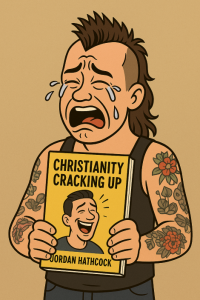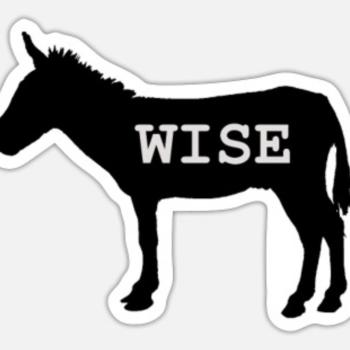
By Jordan Hathcock, author of the critically unread Christianity Cracking Up
To be honest – when I released my book Christianity Cracking Up – I had a secret (and by “secret,” I mean “deeply delusional”) fantasy that it would explode onto the scene like a spiritual Harry Potter.
Pastors would quote it from pulpits. Theologians would praise it through their social media outlets. Fellow authors would quote it on their next Patreon accounts. Joe Rogan would do an honorable mention of my book during a podcast episode with Mel Gibson when discussing how the resurrection represents the multi-verse on acid…
Instead?
Crickets.
Okay, not exactly crickets—because even crickets make noise. This was more like the digital equivalent of dropping a manuscript into a black hole and hearing a soft, mocking belch in return.
Amazon sales: underwhelming. Reviews: A total of 7, I think. Don’t get me wrong – they were great and I’m freaken grateful (just not the number desired if you’re looking to sell books). Instagram posts? A smattering of likes from bots and that one guy who comments on everything with three fire emojis.
And yet, I’m okay…NOW. I was in despair for a bit, and it was the kind of loathing that negatively affected my environment…especially my relationship with my wife (sorry Kbua, thank you for being there when I know it was super hard and annoying). A lot of emotions were spuing into my life and not the healthy kind. I felt distant and not wanting to engage with the zeitgeist in which I wrote my book for.
It was a time of deep reflection and utter anguish (fun combo, huh?). Its’s been almost two years since I published my book…is this “it” when it comes to what my book is going to do?
Look—I’m not writing this in some spiritually bypassing, “God has a better plan” voice while sobbing into my protein shake (get some). I mean it: nothing happened…
And
It’s
FINE.
Actually, it’s better than fine. It might even be—dare I say—faithful?
Because here’s the thing (if I am being honest with myself and reality): Christianity Cracking Up was never about launching a brand, getting a TED Talk, or becoming some version of something I am not. It was about telling the truth—my truth, your truth, the truth that the church is cracking up because it has to if it’s ever going to become what it was always meant to be.
And that kind of truth? It doesn’t always sell. This is not to say that I am anti-success and whoever does sell a lot of books is a sell out and sucks big fat consumer balls. Not at all! I understand that becoming a best-selling author take a tremendous amount of work. Usually it takes 7 or 8 books to get recognized.
Everything has its own way of projecting itself into reality and a successful book that makes money isn’t a bad thing. Obviously, I would love to quit my job and just become a full-time writer, but I got to face a lot of hard truths. The biggest one being the fact that I just cannot spend the time needed to really market myself. Being a husband and a father of 3, I have my reasons (not excuses).
So, it is what it is. It will be on my own time and not this on-the-go-non-stop-loco-motion-instant-gratification world we now see ourselves in.
And
That
Is
OKAY!
Christianity Is Cracking Up, Not Blowing Up
But there is something a little off. Let’s pause for a second and appreciate the absurdity of modern Christian publishing. There’s this subtle (and sometimes not-so-subtle) idea that if you write a book about Jesus, it should be anointed—not just spiritually, but algorithmically. If God is really behind your work, then obviously it should end up in Barnes & Noble next to Bibles and slightly overpriced coffee mugs that say, “Too Blessed to Be Stressed.”
But Jesus never promised us market share.
In fact, the more I think about it, the more suspicious I am of any gospel that demands metrics. Jesus told stories that confused people. He healed and then told people not to tell anyone (marketing fail). He turned away crowds. He said cryptic stuff like, “The last shall be first,” and didn’t even try to optimize it for search engines.
So why was I expecting my book to be a hit?
Maybe I bought into the same lie that the church often buys that producing is the same as transforming. That success is visible. That good fruit looks like packed stadiums, viral videos, or at the very least, someone inviting you to speak at a retreat with a halfway decent snack table.
But maybe true transformation isn’t flashy.
Maybe it happens in the quiet spaces. In the barely-noticed corners. In the one reader who messages you and says, “Hey, your book made me feel a little less insane for still seeing the Christ story as meaningful after all the nonsense I’ve seen.”
Maybe that’s enough.
When Shit Happens, Grace Shows Up
Here’s the radical part of the gospel that still unravels me: it’s not about performance. Not mine, not yours, not Christianity’s.
Grace doesn’t show up after you hit a milestone. It’s there when you blow the milestone up, forget what you were doing, and wander into a field of wildflowers muttering, “Is this anything?”
In the gospel story, God is revealed in a crucified rabbi—not a conquering king. The climax of divine revelation is… a failure. A public, humiliating, “He saved others, why can’t He save Himself?” kind of failure.
And that failure cracks everything open.
It lets the light in. It dethrones our addiction to control and image and measurable success. It invites us to die—not dramatically, but slowly. Daily. Through tiny humiliations like a 2-star Goodreads rating and being ignored at your own book launch party.
(Okay, that last one didn’t happen — my book launch party was one of the best days of my life and I thank everyone who showed up and supported the cause!)
When the book didn’t sell, I felt small. Irrelevant. A little silly.
And then—after the ego bruising wore off—I felt free.
Free to write what matters, not what sells. Free to be faithful, not flashy. Free to tell the truth about a gospel that isn’t about climbing ladders but calming the storms and washing feet.
Let’s Laugh About It (Because What Else Are We Gonna Do?)
Of course, I could spiral into existential despair about late-stage capitalism and the commodification of all things holy. But capitalism isn’t all bad…I mean shit, what is the big go-to phrase in our free market society?: “Failure is part of success”.
Or I could light a candle and dramatically reread Ecclesiastes while sipping something dark and brooding.
But I’d rather laugh.
Because isn’t it funny? This whole setup? That we’re out here trying to market Jesus, like He’s a gluten-free snack bar with emotional benefits?
I mean, I wrote a book about how comedy could help Christianity be more unified…can you say “niche product”?
That we put the wild, world-flipping message of grace into neat little packages with font choices and author photos (which I’ll be honest, took way too long to edit—shout-out to Canva and insecurity)?
That I really thought I could write a book about the absurdity of Christianity and somehow escape being part of the joke?
It’s all so gloriously ironic. And beautiful.
And human.
What I Really Wanted to Say
At the heart of Christianity Cracking Up, I was trying to say something very simple: following Jesus makes less sense the longer you do it—and that’s kind of the point.
It’s a path of unlearning, undoing, unbecoming. It’s the long, slow cracking of your tidy little life into something wild and true. It’s laughing at yourself. It’s holding paradox. It’s being okay with not knowing what the hell is going on most of the time, but still showing up.
I wrote that book because I needed to believe that grace could reach even me—the me that overthinks, over-analyzes, and overcooks every metaphor.
And if even one person reads it and says, “Oh, same,” then that’s enough.
Because the gospel is not a pyramid scheme.
It’s not about scaling up. It’s about coming down. It’s downward mobility. It’s death and resurrection. It’s a mustard seed, not a marketing plan.
So if the book flopped, maybe that’s the most honest reflection of the message itself.
God doesn’t need me to succeed. God needs me to be authentic.
Final Thoughts from Your Local Failed Author
So what now?
I keep writing.
I keep cracking up.
I keep participating in this upside-down Christ who keeps not making sense but somehow still making all the difference.
And maybe I keep selling four books a month to people who accidentally click the wrong link. That’s fine too.
Because this was never about being impressive.
It was about being faithful to something foolish and true. It was about cracking up—in both senses: laughing and breaking.
And you know what happens when something cracks?
Light gets in.
PS: If you did buy the book, thank you. If you haven’t, no pressure. It’s not going anywhere. Like the gospel, it’s there waiting—quietly, awkwardly, probably with a typo I still haven’t caught. Here is a link to the book.
And if you’re feeling like your own life/ministry/work is invisible, unsuccessful, or unraveling?
Welcome.
You’re in good company.
The kind that doesn’t measure worth by output, but by love. By transformation. By the willingness to let things fall apart so something better can rise.
And maybe one day, when we’re old and weird (or just weirder), we’ll look back and say:
“Nothing happened. And that was holy ground.”












